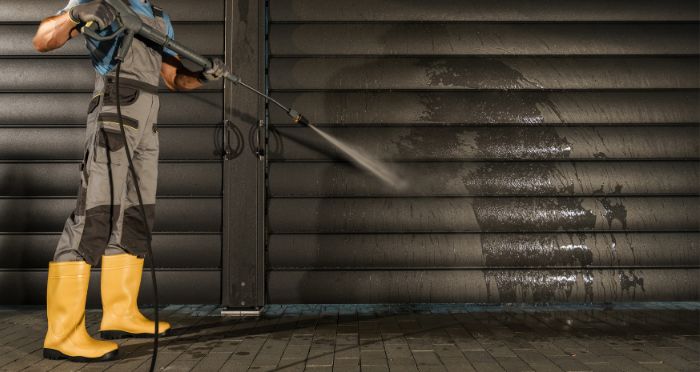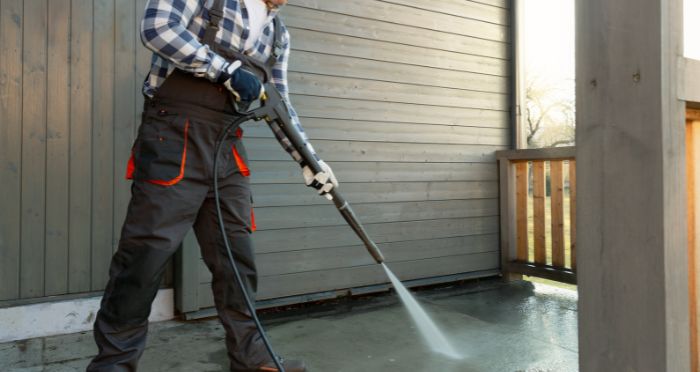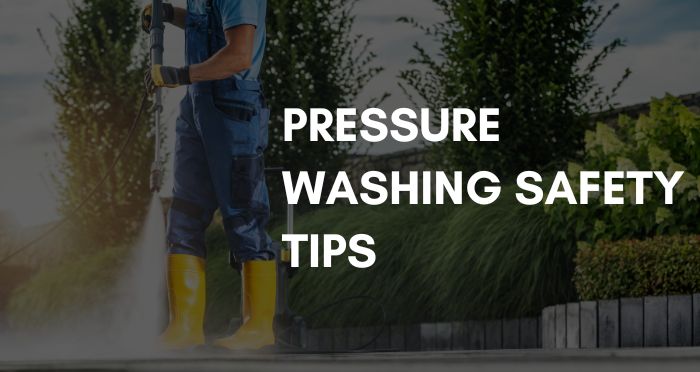Safety first!
Pressure washer safety is no joke. Unfortunately, pressure washers can cause severe injuries and, in some cases, fatalities. This blog post will cover the best safety hacks to operate a pressure washer safely and avoid damage. Pressure washer accidents are 100% avoidable if you follow these easy rules.
Are Pressure Washers Dangerous?

Yes, but not if you follow our safety tips!
Pressure washers are dangerous in the hands of those who aren’t adequately trained. In addition, they might result in severe bodily damage if misused. So make sure you’re using your pressure washer safely, as required by the manufacturer’s guidelines.
Pressure Washer Dangers and Safety Issues

Physical Injuries
You may have been injured in a way that you are not aware of the pressure washer’s safety instructions. It may be the reason you’re dead. Physical injuries can include anything picked up by the washer’s tip and ejected at high speeds, like Broken bones (arms and legs) Internal injuries (liver, spleen).
Picking up something the size of a midget and shooting it over 100 feet can cause massive damage to your skull.
Electrical Shock
Pressure washers use electricity which is pretty much deadly. Suppose you touch any electrical component which completes a circuit while standing in water or touching another grounded object, such as a metal nozzle. In that case, you will be electrocuted by the washer’s power supply unit.
The intensity will depend on how far you’re away from the ground and how wet you are. People near the washer would rocket back due to how much voltage went through them and then hit their head on their roof, destroying it, then fall into their pool, destroying that. Everything happens in a flash. So be careful (or don’t and die).
Dirt, Debris, And Chemical Exposure
You can get dirty when operating a pressure washer. I mean, dirty. Soap, oil, and other chemicals can get into your mouth and eyes, which sucks. It will cause internal damage to your intestines and lungs, as well as blindness.
Damage To Surfaces
A pressure washer can potentially ruin any surface you clean with it. These surfaces include: Concrete Roofs (cause shingles to fly off and water damage), Windows (remove paint, etch the glass, create more streaking than you started with), anything painted (remove paint, etch the surface), Wood (takes off wood finish) Plants (dead plants muthafucka)
Pressure Washing Safety Tips

When it comes to using a pressure washer, there are several safety measures you must adhere to: It’s essential to follow the manufacturer’s instructions carefully.
- Please follow all safety instructions and caution stickers attached to the washer. Before you get started, learn how it works.
- Make sure kids are not within range of the spray nozzle. It’s for their protection, as well as yours.
- Never direct the spray towards people or animals, even outside your working zone. They could be walking closer than you think.
- Ensure that the area is clear of any obstacles before pressure washing, including people and pets. You do not want to injure or scare anyone.
- Ensure that the equipment is grounded correctly and plugged in before starting it up, especially when using a gas-powered pressure washer.
- Use a long hose extension to wash high areas of your home or business while keeping yourself at a safe distance from the spray.
- Wear safety goggles, boots, and gloves at all times when using your pressure washer to protect yourself from any debris that may shoot up at you.
- Ensure that the spray tip is not obstructed or clogged before using your pressure washer. You may need to replace it if it is defective.
- Ensure that your pressure washer has a backup water source, such as a garden hose or puddle, if the main water supply shuts off.
- You should also make sure that you wear protective clothing when washing your home or business.
- Ensure that you are not cleaning your home or business in the rain. You do not want to get electrocuted!
- Do not wear loose clothing or jewelry while working with your pressure washer, as they can get caught in the spray.
- Be aware of where other people and pets are while washing your home or business. You do not want to injure them with the high-pressure spray!
Which is the best option for you: professional or DIY pressure washing?
There are many benefits to both professional and DIY pressure washing.
If your home is large and needs to be cleaned regularly, you may want to consider hiring a professional. Ensure that the cleaners you hire are prepared to work with pressure washers.
When you hire a pressure washing business, its staff will complete the tasks given to them with care. They will also perform all of their responsibilities thoroughly.
If you have a small home or business, you may be better off using a DIY pressure washing. However, you’ll have to put in more effort if you decide to do the cleaning yourself.
You will also notice how challenging and time-consuming the job is when washing a pressure washer. You’ll need to conduct thorough research and educate yourself on using pressure washers to complete DIY jobs.
Wrap Up
Pressure washing can be a great way to clean your home or business, as long as you follow the proper safety measures. Pressure Washer Safety Hacks will teach you all about adequate pressure washing safety.
Please read these safety tips carefully before starting your next pressure washing job. Pressure Washer Safety Hacks is here to help you stay safe!
Best Selling Pressure Washers
[amazon bestseller=”pressure washer”]